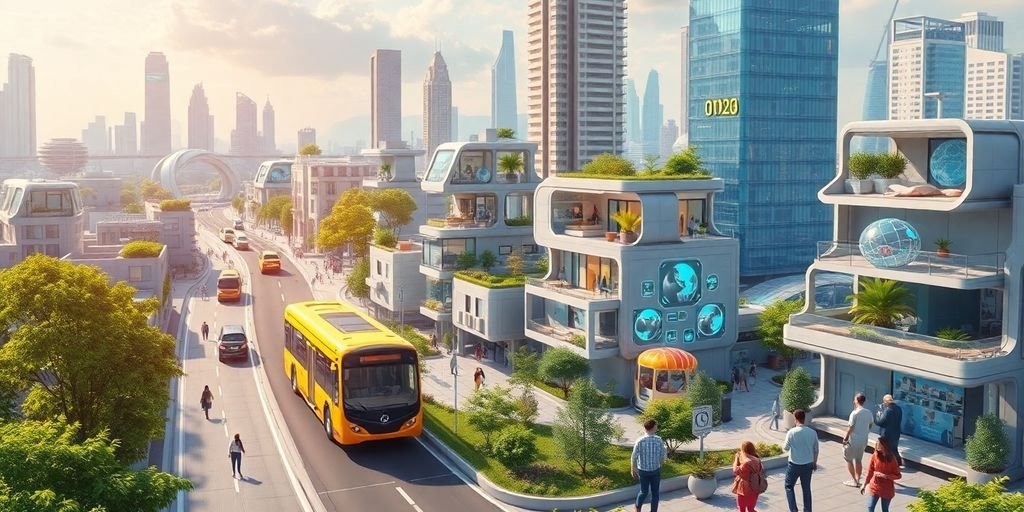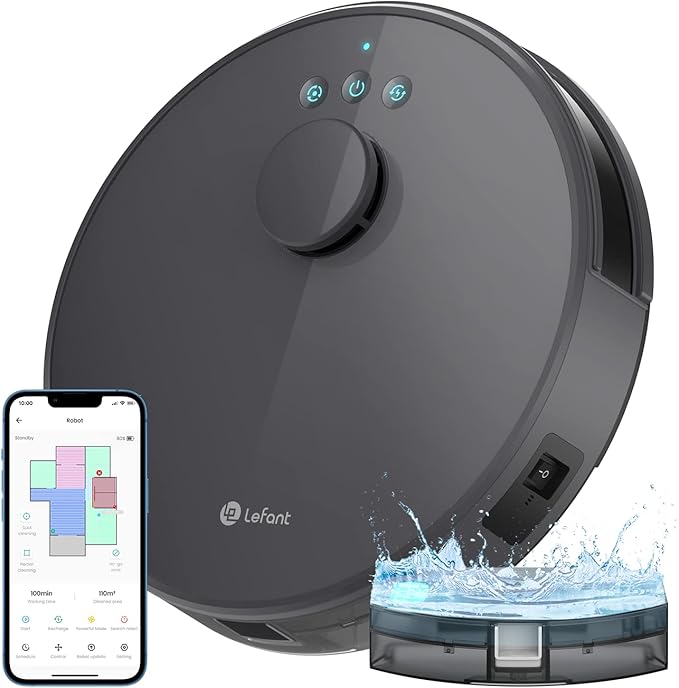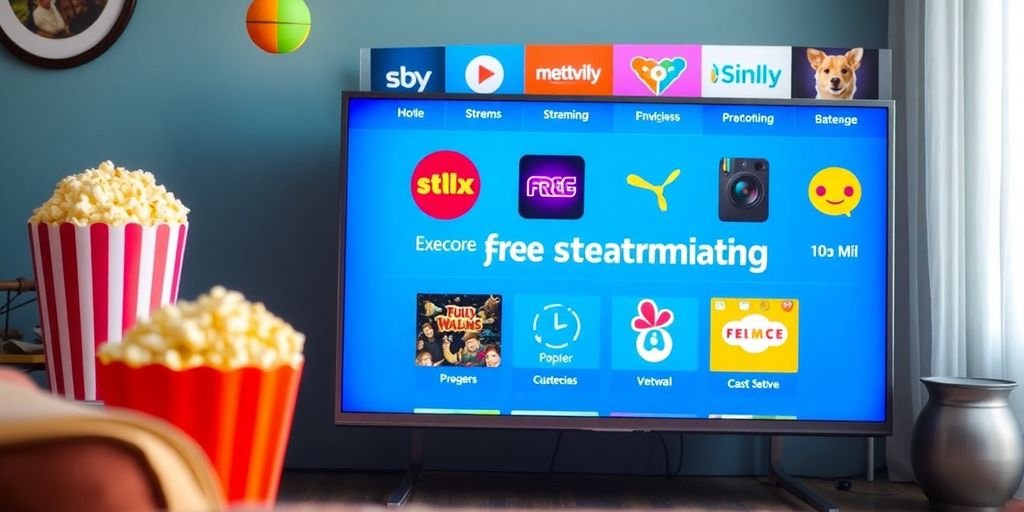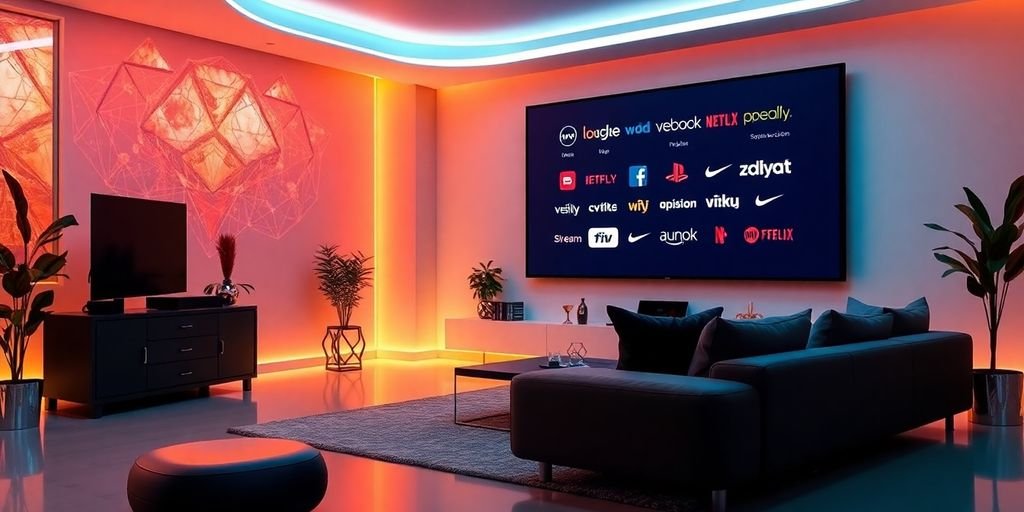As we look ahead to 2025, it’s clear that technology will play a huge role in shaping our everyday lives. From how we work and learn to how we manage our health and environment, future tech is set to transform our routines in ways we can only begin to imagine. This article explores some of the most significant impacts of future tech on our daily existence, highlighting the innovations that will define our lives in just a few short years.
Key Takeaways
- Future tech will reshape workspaces, making remote work more common and integrating smart office solutions.
- Smart technologies will enhance daily life, from home automation to wearable health devices that keep us connected and informed.
- Education will evolve with virtual learning environments and AI-driven personalized education, making learning more accessible.
- Healthcare will see advancements through telemedicine and AI, improving diagnostics and treatment options for everyone.
- Sustainability efforts will be boosted by smart energy solutions and urban farming technologies, helping us live greener and more efficiently.
Transforming Workspaces Through Future Tech
The way we work is changing, and it’s changing fast. By 2025, the impact of technology on our workspaces will be huge. We’re not just talking about faster computers; we’re talking about a complete shift in how, where, and why we work. It’s a pretty exciting time, but also a little overwhelming if you don’t keep up with the trends. The organizations and businesses of tomorrow will be driven by a deeper desire to create positive change in the world.
Remote Work Revolution
Remote work isn’t just a trend; it’s becoming the norm. The pandemic accelerated this shift, and now many companies are realizing the benefits of a distributed workforce. People have proven they can be productive from anywhere, and they like the flexibility. I know I do! It’s not just about working from home either. People are working from coffee shops, co-working spaces, even other countries. The key is having the right tools and a company culture that supports remote work.
- Better work-life balance
- Increased productivity
- Reduced overhead costs for companies
I think the biggest change is that we’ve realized work isn’t a place, it’s an activity. We can do it anywhere, anytime, as long as we have the right technology and a good internet connection. This shift is empowering workers and forcing companies to rethink their traditional office setups.
Smart Office Solutions
Even with the rise of remote work, offices aren’t going away completely. They’re just evolving. Smart office solutions are all about making the physical workspace more efficient, comfortable, and collaborative. Think sensors that adjust lighting and temperature based on occupancy, smart meeting rooms that automatically start video conferences, and AI-powered assistants that can help you find a free desk or book a conference room. It’s all about creating a seamless and productive work environment.
| Feature | Benefit |
|---|---|
| Smart Lighting | Energy savings, improved employee comfort |
| Automated Booking | Reduced wasted time, better space usage |
| Environmental Controls | Personalized comfort, health benefits |
AI-Driven Productivity Tools
AI is already changing how we work, and its impact will only grow in the coming years. AI-driven productivity tools can automate repetitive tasks, provide personalized insights, and help us make better decisions. Imagine an AI assistant that schedules your meetings, filters your emails, and even writes your first drafts of reports. It sounds like science fiction, but it’s becoming a reality. These tools can free up our time and energy to focus on more creative and strategic work. I’m excited to see how AI-powered tools will continue to evolve and transform the way we work.
- Automated task management
- Personalized learning and development
- Improved decision-making
Enhancing Daily Life With Smart Technologies

It’s wild to think how much tech has already changed our lives, but 2025 is shaping up to be even crazier. We’re not just talking about faster phones; we’re talking about tech that’s woven into the fabric of our daily routines, making things easier, more efficient, and, hopefully, a little more fun. The integration of smart technologies promises a revolution in how we live, work, and interact with the world around us.
Home Automation Innovations
Remember when "smart homes" seemed like something out of a sci-fi movie? Now, it’s becoming the norm. I’m talking about lights that adjust to your mood, thermostats that learn your schedule, and refrigerators that order groceries for you. It’s all about convenience, but also about saving energy and reducing waste. Imagine a world where your house anticipates your needs before you even realize them. It’s pretty cool, but also a little spooky, right? I’m still trying to figure out if I want my house to know everything about me. But the smart gadgets are getting better and cheaper, so it’s hard to resist.
Wearable Health Tech
My friend Sarah is obsessed with her new health tracker. It’s not just about counting steps anymore. These devices are monitoring everything from heart rate variability to sleep patterns, and even blood glucose levels. The idea is to catch potential problems early and give you personalized insights to improve your health. It’s like having a tiny doctor on your wrist. I’m a bit skeptical, but I have to admit, it’s tempting. Here’s a quick look at some potential benefits:
- Early detection of health issues
- Personalized fitness recommendations
- Improved sleep quality
- Stress management tools
Personalized AI Assistants
Okay, I’ll admit it, I’m totally reliant on my AI assistant. It manages my schedule, answers my questions, and even tells me jokes (some of them are actually funny!). But in 2025, these assistants are going to be even more powerful. They’ll be able to anticipate your needs, make recommendations based on your preferences, and even handle complex tasks like managing your finances or planning your travel. It’s like having a personal concierge, but without the hefty price tag. I’m a little worried about becoming too dependent on AI-Powered Personal Finance, but I can’t deny that it makes my life a lot easier.
The rise of smart technologies is definitely exciting, but it also raises some important questions. How do we ensure that these technologies are accessible to everyone, regardless of their income or location? And how do we protect our privacy in a world where everything is connected and monitored? These are the challenges we need to address as we move towards a more tech-infused future.
The Evolution of Education in a Tech-Driven World
Education is changing fast, and tech is a big reason why. It’s not just about replacing textbooks with tablets; it’s a whole new way of learning and teaching. Think about how different things were just a few years ago – now, it’s all about adapting to a world where knowledge is always at your fingertips. The pandemic really sped things up, forcing schools to get creative with online learning. Now, we’re seeing some cool innovations that are likely here to stay.
Remote Work Revolution
Remember when online classes felt like a temporary fix? Now, they’re becoming a normal part of the education landscape. The shift to virtual learning has opened up educational opportunities for students in remote areas and those with mobility issues. It’s not just about watching lectures online; it’s about interactive simulations, virtual field trips, and personalized learning paths. The challenge is making sure everyone has access to reliable internet and the right devices. Broadband access is becoming a human right-level issue.
Smart Office Solutions
AI is starting to play a bigger role in education, from grading papers to creating personalized lesson plans. Imagine a system that adapts to each student’s learning style and pace. It can identify areas where a student is struggling and provide extra support. It’s like having a personal tutor for every student. But, there are also concerns about data privacy and the potential for bias in AI algorithms. We need to make sure these tools are used responsibly and ethically. The use of AI to optimize the logistics of resource use could dramatically improve our education system.
AI-Driven Productivity Tools
Education isn’t just about memorizing facts; it’s about developing critical thinking skills and creativity. Tech can help with that too. Think about virtual reality simulations that allow students to explore historical events or conduct science experiments in a safe environment. Or collaborative online platforms where students can work together on projects, regardless of their location. The key is to use tech in a way that enhances learning, not just replaces traditional methods.
The reimagining of the classroom for digital life is still underway, but we can expect both the practice and expectations of learning to be changed radically by tech. Mentorship, whether in the classroom, laboratory, or at work, is indispensable. Tools for collaboration will be extended.
Healthcare Advancements Shaped by Future Tech
Healthcare is changing fast, and by 2025, it’s going to look pretty different thanks to new tech. I’m not talking about small tweaks, but big shifts in how we get diagnosed, treated, and even monitored. It’s exciting, but also a little scary to think about how much our health will depend on things like AI and wearable devices.
Telemedicine and Remote Monitoring
Remember when going to the doctor meant sitting in a waiting room for ages? Those days are fading. Telemedicine is becoming the norm, letting you chat with doctors from your couch. Remote monitoring takes it a step further, with devices tracking your vitals and sending data straight to your doctor. It’s super convenient, especially if you live far from a clinic or have trouble getting around. Plus, it could catch problems early, before they become serious. I can see digital tools becoming more and more important.
AI in Diagnostics and Treatment
AI is making its way into pretty much every field, and healthcare is no exception. AI algorithms can analyze medical images, like X-rays and MRIs, to spot diseases faster and more accurately than humans sometimes can. It’s not about replacing doctors, but giving them a powerful tool to make better decisions. AI can also help personalize treatment plans based on your specific genes and medical history. It’s like having a super-smart assistant helping your doctor figure out the best way to get you healthy.
Wearable Health Devices
Forget just counting steps – wearable health devices are getting seriously advanced. We’re talking about devices that can monitor your heart rhythm, blood sugar, and even detect early signs of illness. The data collected can be used to give you personalized insights into your health and help you make better lifestyle choices. Imagine getting an alert on your watch telling you to slow down because your heart rate is too high, or a notification that your blood sugar is dropping. It’s like having a personal health coach on your wrist, constantly looking out for you.
The rise of health tech is a double-edged sword. While it promises to make healthcare more accessible and effective, it also raises concerns about data privacy and security. We need to make sure that our health information is protected and used responsibly, or we risk losing trust in these technologies altogether.
Here’s a quick look at how wearable tech is evolving:
- Enhanced Sensors: More accurate and diverse data collection.
- Personalized Insights: AI-driven analysis for tailored recommendations.
- Seamless Integration: Connecting with other health platforms and devices.
Sustainable Living Through Technological Innovations
It’s 2025, and let me tell you, going green isn’t just a trend anymore; it’s a necessity, and tech is stepping up big time. We’re seeing some seriously cool stuff happening that’s making it easier for everyone to live more sustainably. From how we get our energy to how we deal with waste, technology is changing the game. The integration of technology into sustainable practices is becoming increasingly seamless.
Smart Energy Solutions
Okay, so picture this: your house basically runs itself when it comes to energy. Smart grids are becoming more common, optimizing energy distribution and reducing waste. Solar panels are way more efficient and affordable, and people are actually using them. Plus, we’re seeing some interesting developments in innovative battery technologies for storing renewable energy, which is a total game-changer. It’s not just about generating clean energy; it’s about using it smartly.
Urban Farming Technologies
Who needs a farm when you can grow your food right in the city? Vertical farms are popping up everywhere, using way less water and land than traditional agriculture. Hydroponics and aeroponics are becoming more mainstream, making it easier to grow fresh produce year-round. And get this – AI is even getting involved, optimizing growing conditions for maximum yield. It’s like having a personal AI assistant for your veggies!
Waste Reduction Systems
Trash is a problem, no doubt. But tech is helping us tackle it head-on. We’re seeing smarter recycling systems that can sort waste more efficiently, reducing contamination and increasing recycling rates. Plus, there’s a growing focus on reducing waste at the source, with companies using technology to design products that are more durable and easier to repair. Composting is also getting a high-tech makeover, with automated systems that can turn food scraps into valuable fertilizer. It’s all about closing the loop and minimizing our impact on the planet.
The use of AI to optimize the logistics of resource use could dramatically improve our nutrition, education, health and even our social interactions. The addition of sensor feedback into automation of all types, from traffic handling to regulatory regimes, could greatly improve the functionality of our systems.
Here’s a quick look at how waste reduction is improving:
| System Type | 2020 Recycling Rate | 2025 Recycling Rate | Improvement |
|---|---|---|---|
| Traditional Recycling | 25% | 35% | 10% |
| Smart Recycling | N/A | 50% | N/A |
| Composting Systems | 5% | 15% | 10% |
Here are some things that are helping:
- Better recycling tech
- More composting programs
- Less single-use packaging
The Role of AI in Everyday Decision Making
AI is slowly but surely creeping into every corner of our lives. It’s not just about robots taking over factories anymore; it’s about how we make choices, big and small, every single day. It’s kind of wild to think about how much we’re already relying on algorithms to guide us.
AI-Powered Personal Finance
Remember the days of balancing checkbooks and stressing over spreadsheets? Now, AI is stepping in to manage our money. These tools can analyze spending habits, predict future expenses, and even suggest investment strategies. It’s like having a financial advisor in your pocket, but is it always right? I’m not so sure. It’s important to remember that AI is only as good as the data it’s trained on, and financial markets can be unpredictable.
- Automated budgeting and savings plans
- Personalized investment recommendations
- Fraud detection and prevention
Smart Shopping Experiences
Online shopping has already changed the game, but AI is taking it to a whole new level. Algorithms track our browsing history, analyze our preferences, and bombard us with targeted ads. It’s getting harder and harder to resist the urge to buy things we don’t really need. I’ve definitely fallen victim to the AI performance hype more than once.
- Personalized product recommendations
- Dynamic pricing based on demand
- AI-powered chatbots for customer service
Automated Home Management
From smart thermostats to robotic vacuum cleaners, our homes are becoming increasingly automated. AI is learning our routines and preferences, adjusting the temperature, turning on the lights, and even ordering groceries. It’s convenient, sure, but it also raises some serious questions about privacy and control. I mean, do we really want our homes to know everything about us?
It’s easy to get caught up in the convenience of AI, but we need to be mindful of the potential downsides. Are we sacrificing our autonomy and privacy for the sake of efficiency? It’s a question we need to ask ourselves as AI becomes more deeply integrated into our lives.
Navigating Privacy and Security in a Tech-Infused Society

It’s wild to think how much tech has wormed its way into every nook and cranny of our lives. But with all this convenience comes a big question mark: how do we keep our data safe and our privacy intact? It’s not just about hackers anymore; it’s about companies knowing way too much about us and governments potentially watching our every move. It’s a tricky balance, and honestly, I’m not sure we’re getting it right.
Data Protection Challenges
Okay, so picture this: every time you use an app, browse the web, or even just walk around with your phone, you’re leaving a trail of data. Companies collect this stuff like crazy, and sometimes, they don’t do a great job of protecting it. Data breaches are becoming more common, and it’s getting harder to know who to trust.
Here’s a quick look at the projected global IT spending increases:
| Segment | Projected Growth (2025) |
|---|---|
| Data Center | 12% |
| Software | 11% |
| IT Services | 8% |
| Devices | 5% |
It’s not just about financial data either. It’s about your health info, your location, your browsing history – everything. And once that data is out there, it’s really hard to get it back.
Surveillance and Personal Freedom
This is where things get a little scary. Think about all the cameras around, the facial recognition tech, and the way governments can track people’s movements. It’s like something out of a dystopian movie. Sure, it can help catch criminals, but it also means that our freedom is being chipped away, bit by bit.
- Increased monitoring of online activity.
- Expansion of facial recognition technology in public spaces.
- Use of AI to predict and prevent crime.
It’s a slippery slope. Where do we draw the line between security and personal freedom? It’s a question we need to answer, and soon.
Building Trust in Tech
So, what can we do? Well, for starters, we need to demand more from tech companies. They need to be transparent about how they collect and use our data, and they need to invest in better security measures. We also need stronger laws to protect our privacy and hold companies accountable when they mess up. It’s not going to be easy, but it’s essential if we want to live in a world where technology serves us, not the other way around. We need to find ways to improve privacy protection.
Here are some steps we can take:
- Support companies that prioritize privacy.
- Advocate for stronger data protection laws.
- Educate ourselves and others about privacy risks.
Looking Ahead: The Tech-Driven Future
As we wrap up our exploration of what life might look like in 2025, it’s clear that technology will play a huge role in shaping our daily experiences. Sure, there are some worries about inequality and privacy, but there’s also a lot of potential for improvement. Imagine a world where working from home is the norm, and smart systems help us navigate everything from healthcare to education. We might see AI making our lives easier, and virtual reality could change how we connect with others. It’s a mixed bag, really. Some folks might struggle to keep up, while others thrive in this tech-heavy environment. But one thing’s for sure: the way we live, work, and interact will be transformed. The future is coming fast, and it’s going to be interesting to see how we adapt.
Frequently Asked Questions
What changes can we expect in workspaces by 2025?
By 2025, many people will work from home more often, using smart technology to stay connected. Offices will be equipped with tools that help everyone work better together, even from a distance.
How will smart technology improve our daily lives?
Smart gadgets will make our homes easier to manage. We’ll have devices that control everything from lights to security systems, making life more comfortable and convenient.
What will education look like in 2025?
Schools will use virtual classrooms more, allowing students to learn from anywhere. Personalized learning will be common, helping each student learn at their own pace.
How is technology changing healthcare?
Healthcare will become more accessible through telemedicine, where doctors can treat patients online. Wearable devices will help monitor health in real-time.
What role will technology play in promoting sustainability?
Tech innovations will help us live more sustainably. We’ll see smart energy systems and urban farms that use less space and resources.
What should we know about privacy and security with future tech?
As technology grows, so do concerns about privacy. It’s important to be aware of how our data is used and to find ways to keep our personal information safe.






